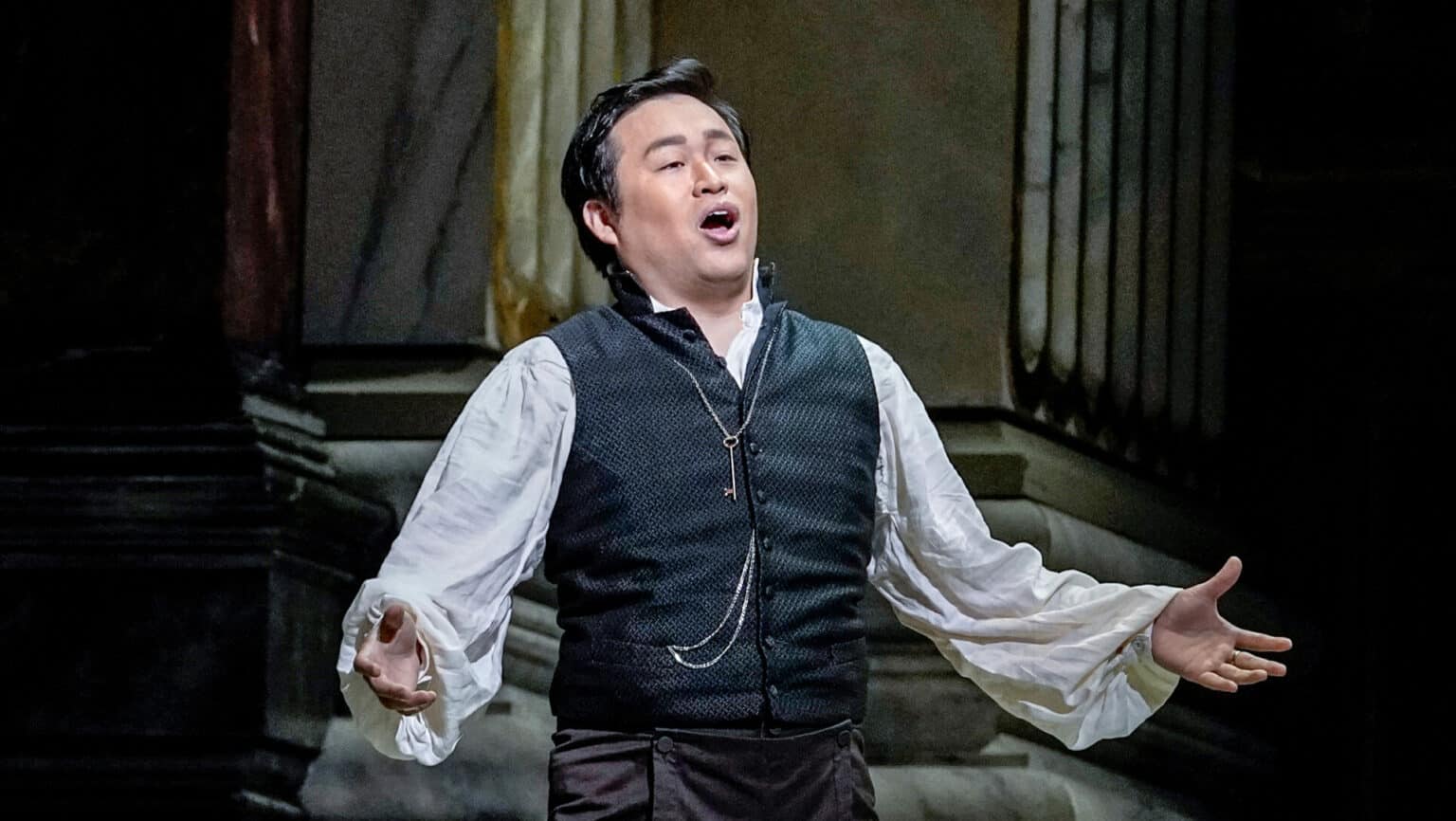Want to be Boston Symphony’s new cello?
main
This is today’s audition set-up. Not exactly friendly.
There has been a rush to repair the…

Arturo Benedetti Michelangeli, b. Brescia, January 5, 1920…

The death has been announced of Andrzej Klimczak,…

A tenor who was audibly below par, an…

Session expired
Please log in again. The login page will open in a new tab. After logging in you can close it and return to this page.
Well auditions aren’t supposed to be about hiring your friends
When Richard Burgin retired as Concertmaster of the BSO back in yesteryear, Alfred Krips, the Assistant Concertmaster expected to move up to the first chair. BUT the first BSO blind audition was arranged. The winner move up from the back rows of the violin section. Joseph Silverstein went on to a distinguished career as Concertmaster, renowned soloist, distinguished conductor and committed educator. A rousing cheer for blind auditions
If Alfred Krips thought he was going to move up (or sideways to his left) to the conertmaster’s chair, he was the only person in Greater Boston who thought it would happen. Silverstein’s emergence did not happen out of the blue or because of the particular process of auditioning. By the time of Burgin’s retirement, Silverstein had already moved up to the third stand (outside) of the first violin section and was among BSO “insiders” the odds-on favorite to get the job.
And it didn’t hurt Joe’s chances that the new music director of the day, Erich Leinsdorf, was quite impressed with Joe. that said, Al Krips soldiered on next to joe Silverstien for many years to come.
Friendly?
Well you can’t complain of bias in competitions and then bemoan it’s not friendly when they audition blind for an important position.
Where’s the carpeted runner leading to the audition spot? Without it, you can clearly hear a woman’s high heels as she walks up.
Nowadays, not all women wear high heels, and many would wear comfortable and silent shoes to an audition…
Wasn’t the final round of the cello audition yesterday?
Do Brit and Euro orchestras do it differently? If not, I fail to see the point of NL’s comment and headline, apart from the usual propensity to bash American institutions whenever there’s even a sliver of an opportunity.
There are some differences as to how candidates are selected and auditions conducted between German and British and American orchestras but that’s neither here nor there.
Looks just fine to me. At least the candidates get to play in the hall where they will be performing if they win.
Orchestras in Germany also use a curtain until the final rounds.
Orchestra auditions are tough. And no matter how many good candidates there are and no matter how brilliantly they play, only one musician can win.
My understanding is that the BSO has been using this sort of set up for many years going back to the Munch days, if not before.
Why, it looks very well set up for an orchestral audition. It’s supposed to be anonymous, not friendly.
How about a roaring fire on stage? Would that be friendlier?
(Insert viola joke here.)
Norman does understand how orchestra auditions work, right?
Interestingly, the most popular post in the history of my blog (2,500 + FB likes) is about the American audition process. The system is both different and better in the UK and Europe.
The comments, including some from articulate defenders of the system from a number of leading US orchestras, are well worth reading, too.
http://kennethwoods.net/blog1/2012/06/28/cruel-and-unusual-its-time-to-change-the-audition-system/
Thank you for sharing this link Mr. Woods. A very interesting read.
The truth is that far too many graduates are entering the field each year and there simply isn’t a market for them. Count the number of American music schools, how many graduate each year for the past ten years vs how many positions are available. Blame music schools for taking hundreds of thousands of dollars from young, aspiring, naive musicians instead.
This could explain the exceptional quality of regional US orchestras these days.
This is a very naive comment at best. Music schools do not force anyone to pursue musical studies. People have a choice not to pursue music. And, most institutions of higher education in the US offer scholarship/talent awards to the most talented and competent prospective students. One cannot blame training institutions for the current state of musical affairs (orchestras) in the world today.
Despite the photo and alleged blindness of auditions, the ENTIRE audition process is far from blind or anonymous and this fairytale needs to end. Almost all auditions take place over two rounds and it is a very common practice that substitute musicians already playing with that orchestra are invited and “pre-selected” to go onto the final round without being subjected to the first round and playing to a curtain where a formless voice screams out “THANK YOU!” after 25 seconds. Since many final rounds are NOT blind, these “pre-selected” candidates’ identities are always known. Don’t believe me? Ask any personnel manager and they won’t deny it.
Yes they will – at least some of them – because that is not the way it is done in many American orchestras including mine. Subs and orchestra members are never allowed to audition without playing at least one round behind the screen. Besides, our auditions usually have at least three or quite often four rounds, and only the very last one – when there are not more than handful of candidates remaining – is screenless.
Yes, the important phrase is “many orchestras,” therefore, many do it the way I described– based on my personal experience and friends who observed the same. Look, orchestras can hold any auditions any way they like. Alleged blind auditions are done for one reason only: fear of lawsuits based on discrimination against protected classes because of decades of lily white and all male orchestras. My only complaint is that if you say it’s blind, then don’t dismiss everyone who auditioned after the first round and say that ONLY a PRE-SELECTED group will be in the final round.
Your logic is faulty. My statement that “many” orchestras audition the way I described it does *not* mean that “therefore” many do it differently. It only means that I cannot guarantee that there is not one weird orchestra somewhere that does not follow common procedures that I mentioned. However, you have not named any such culprits so far. In my several decades of taking and adjudicating auditions in major American orchestras, I have never witnessed a scenario that you have described in your last sentence. When and where have you seen this? Tell us about it so that we make sure to avoid such shameless organization.
I have also been wondering where the carpet was. It is not too difficult to guess a person’s gender from the sound of walking (even if one is not wearing high heels).
You can also often tell by a candidate’s breathing.
I remember Prof Rainer Kuchl (concertmaster of the Vienna Phil) being interviewed by Sean Rafferty on BBC’s In Tune a few years ago. Talking about these very issues Prof Kuchl made the memorable comment: ” Some women…..play like men…..(long pause)….and some men……play like women”.
Playing is such an individual thing that I am not sure even this setup is completely bias proof! But you have to try to be fair and this is as impartial as you are likely to get. As to stress, a screened audition is a great deal easier than the realities of the job. The problem is that orchestral playing has very little to do with the things tested under these conditions. In past days, when the number of competent players was small, the screened audition was a good way to weed out incompetents. Nowadays, there are very few incompetents out there: teaching and study are so good. This means that the selection process can turn into an exercise in error counting – and that in turn runs the risk of favouring the player who has least imagination and has trained for it like a target shooter. If you’re appointing a sub-principal or section player, doing it by audition alone will almost certainly give you the wrong person. The process needs to evolve by making audition demands then testing ensemble skills and what British players call “radar” – the ability to integrate, listen, respond. And in a lot of places this is happening: Norman Lebrecht is making a point not worth making.
Good point about the lack of carpeted runner; my American orchestra always uses one for auditions. Other than that, this looks like a typical setup.
One has to be a fairly good
player followed quickly by who you know ,who you studied with etc . To believe otherwise is being naive .
Add to that WHERE one has studied.
Please explain what a friendly setting should look like.
The only unusual aspect of our auditions relative to other American orchestras is our choice, as an audition committee, to sit on stage with the performers instead of out in the audience. The acoustics in Symphony Hall are such that the best chance to hear what makes an individual unique is to be closer to them than 20 rows away, which is the practice for most other orchestras in the U.S. Having taken a dozen auditions prior to landing here recently, I assure you this is how it’s done in the States and while not a perfect process, it’s the most practical and logistically feasible given how many applicants most orchestras receive for a given audition.
Sorry, two* dozen 🙂
Uhhhh no.
Many of the best don’t always get major scholarship money.
And by getting into a music school and being told that one is especially gifted, gifted enough to make it, is misguiding to a young aspiring musician.
There are too many graduates. There are so many auditions in which there is no winner, and often nobody even makes the finals. What does that tell you?
It tells me that, like all performance-based professions, only the best are successful and that those few are grossly outnumbered by those who are not as good. How long should we treat students as tiny children before we ask them to figure out for themselves that not everyone can live their dreams if they’re not as good as the person next to them?